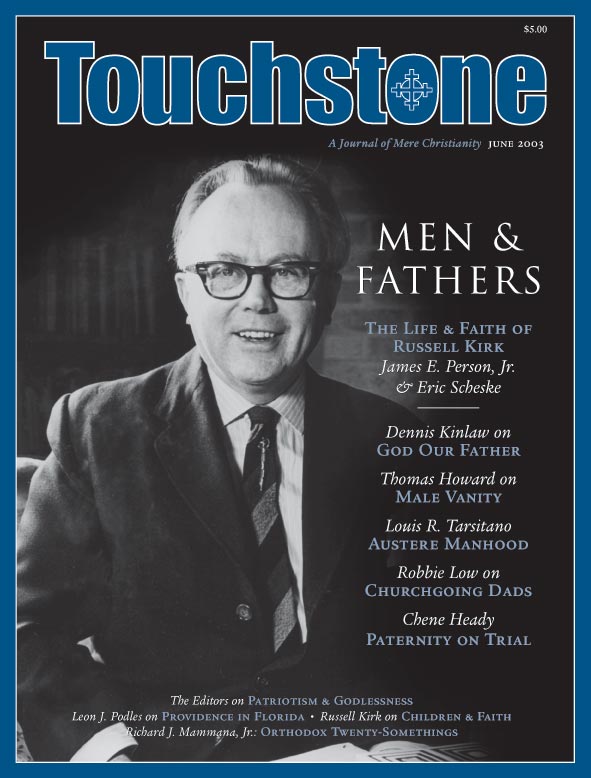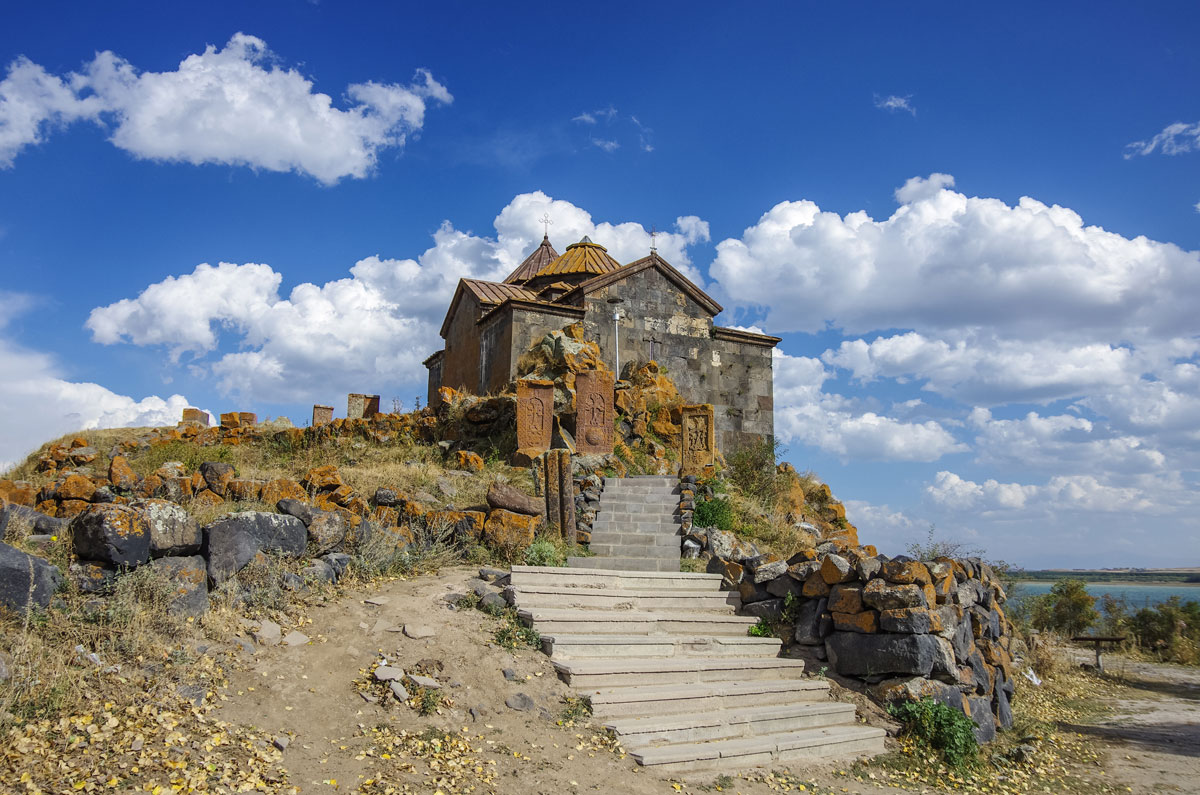American Reservists
Last March, Eugene McCarthy compared President Bush to the ancient Romans, who attacked northern Africa “because they needed something to do.” He seems to have tossed off the remark without much thought, but the story of Rome’s war on Carthage is more relevant to our situation than he may have realized.
The people of Carthage were “practical” and “efficient” and therefore devil worshippers, G. K. Chesterton wrote in chapter seven of The Everlasting Man. “There was a tendency in those hungry for practical results, apart from poetical results, to call upon spirits of terror and compulsion; to move Acheron in despair of bending the Gods. There is always a sort of dim idea that these darker powers will really do things, with no nonsense about it.”
In Carthage, “the god who got things done bore the name of Moloch, who was perhaps identical with the other deity whom we know as Baal, the Lord.” Moloch required those who wanted to win his favor to toss infants into a red-hot furnace. This, Chesterton argued, so revolted the Romans that they destroyed Carthage, leaving no stone upon another and sowing the fields with salt. They were not very good men themselves, but they knew and hated such evil.
McCarthy erred, if Chesterton is right, in thinking that the Romans fought with Carthage because they had nothing else to do. “If the Romans were ruthless,” Chesterton concluded, “it was in a true sense to an enemy, and certainly not merely a rival. They remembered not trade routes and regulations, but the faces of sneering men; and hated the hateful soul of Carthage.”
The Current War
In the current war—the allied troops have won Baghdad as I write—Americans may well think of themselves as the Romans and of Hussein’s regime (though not the Iraqi people) as the Carthaginians. Americans have a certain rough-and-ready moral sensibility that rebels against such Molochian regimes, which offer Moloch their own sacrifices of the vulnerable and the innocent. Hussein’s was—was, in this case, the sweetest of words—a regime happy to sacrifice its own people, to starve them, gas them, shoot them, bomb them, torture them, feed them into plastic shredders feet first and toss their children into dungeons.
Americans feel—not consistently, not always altruistically, but often—that these things should not be. Sometimes this often latent or dormant moral sense rises to action. It often does, as today, when we think our own life is at stake, but a moral sense is not the less genuine or effective for being mixed with a desire to protect one’s nation from danger. As the President found, the liberation of Iraq was the winning argument in convincing a hesitant nation to support the war.
Those on the left and right who speak as if the war were being waged only from the basest of motives have misunderstood something about the American character. Certainly militarists and bigots and “chickenhawk” romantics wanted the war for the wrong reasons, but they are not the only people in favor, and their motives may not have been unmixed. Many Americans simply think that we must remove such a man from power, and if possible from this world. We remembered not oil wells, but the face of a sneering man, and hated the hateful soul of Hussein.
But we must think of America as Carthage as well as Rome. And indeed, the parallel is even more obvious in our case than in Hussein’s. We have our own public worship of Moloch, and in this country his rites take much the same form as they did in Carthage.
In America, over one million children are murdered before birth each year, and to do so is legal and has been legal for thirty years. Some high percentage of Americans—10 percent? 15 percent? 20 percent?—have had or sponsored abortions. Since 1973, perhaps 42 million Americans have been killed before birth—one for just every seven Americans alive. A majority of the nation’s elected political leaders and of its highest court have consistently held that the murder of the unborn is a public good. At various times the American government has pushed the practice on the rest of the world and used its economic power to override the moral sensibilities of smaller, weaker nations.
One of the country’s two main political parties is dedicated to defending this “right” in all circumstances, and most of its members and almost all of its leaders will defend the murder of the baby even when he is almost born. The other party is officially opposed, but its practice is sometimes equivocal, and it is happy to have among its leadership and under its “big tent” those who favor the “right” of abortion.
A large industry has grown up to provide and support this “service,” and a huge industry has grown up to provide the sexual stimulation that renders the “service” necessary. This murder of the unborn has, one can be sure, the tacit support of many others who find children a drag upon efficiency and profits and their occasional elimination an aid to business. The vast majority of these murders are committed for convenience, which is to say, so that the woman (and her husband or partner, and her employer, too) can be “practical” and “efficient.”
America’s Moloch
It is hard not to see abortion as Molochian, and the society in which it flourishes as it does in our society as a society that worships Moloch, though here his names are “Freedom” and “Choice” and “Self-Determination” and “Personal Autonomy.” What is the real difference between throwing your baby into a fiery furnace to placate your god and exposing him to the abortionist’s scalpels to placate your boyfriend or husband or boss or yourself?
And abortionism is not the only problem. There is pornography (the soft kind that appears on television and in the magazines featured at the checkout counter, as well as the hard), the appeals to greed, lust, vanity, and envy by which nearly every company tries to sell its wares, the rigging of the laws to aid the large corporation and harm the small businessman and the consumer, the use of government, as in the public school monopoly, to separate children from their parents and to indoctrinate them into the secular mind and its view of sexuality unrestrained by morality.
And in our past there is much to be ashamed of: the stealing of the land from the Indians who lived on it, and the killing of those who resisted; the decades of chattel slavery, and the century and more of segregation that followed; the use of rivers and lakes to dispose of filth and toxins; the use of government to oppress the weak and vulnerable. Ours is a spotted record.
But then: We fought a war that ended slavery and a century later—late, of course, but still it happened—a country that was almost all white accepted the claims of the civil rights movement. Government has tried to help the weak and vulnerable, and protect the environment, and enforce racial equality, and aid the poorer nations of the world (whether the policies were wise is not relevant here). In Iraq, America risked its soldiers’ lives to keep Iraqi civilians safe. There is something clean underneath the spots. Men and women are returning to this country in body bags because there is something clean beneath the spots.
I suppose this explains why so many Christians, including the editors of Touchstone, feel somewhat ambivalent about our country. While patriots, we do not feel entirely at home. While feeling a pride in our history and in our present, we do not think that America is God’s country, a city set on a hill, a Christian nation. At a moment when many Christians have divided sharply into the alienated and the Americanist, when some follow the National Council of Churches and others the “Christian Right,” we find ourselves rejecting both while sympathizing with both.
We know that America has deeply offended against God and his law, that in many ways (not just its frenzy of abortions) our society is shaking its fist at heaven. We give America two cheers, or one, but not three.
We cheer because there is much to cheer. We despise the leftists and rightists who talk in hysterical terms about America as if it were actively malign and who seem to live fundamentally alienated from the nation while enjoying all its benefits, such as the freedom to live in such alienation and encourage it in others. They are at best simple-minded and ungrateful, and at worst blinded by their alienation—quite often a kind of adolescent self-indulgence, even for those in their sixties—and what seems in many cases to be a hatred now far beyond reason. They will not praise those good things a man ought to praise.
And yet. And yet. A Christian cannot look at the number of abortions in this country and feel unalienated himself. Patriotism is a good thing, and indeed as Chesterton argues elsewhere a godly thing, but not an easy thing for the Christian who loves his country not only because she is his country but also for what she is and aspires to be, yet must judge her by a higher standard and knows how badly she fails. And knows, in fact, how much she repudiates that standard.
The Aloof Christian
The American Christian ought to stand aloof from alienation and Americanism, because neither tells the whole truth, though both say something true. He ought not to be found talking about “the American Babylon” and burning American flags while calling for revolution. That is a form of lying. He ought not to be found cheering any American policy and calling it Christian, and talking of our history as if it were near perfection. That is also a form of lying.
The truth is that America is a country we ought to love not only because it is our country but also because it is lovable. And the truth is also that America is a country we cannot love unreservedly because it does much that is deeply wicked.
What keeps us from feeling the alienation that others do is the knowledge that the religion of Moloch may be at least partly defeated, even after thirty years of legal establishment. We are in the position of the abolitionists before the Civil War, when despair of the nation and a fatal disgust at her sins seemed justified. But as she did then, America has still within herself the possibility of repentance and revival. No country can be considered lost to Moloch that has such a large pro-life movement, and that finds his religion defeated even in Congress and perhaps, someday, in the Supreme Court.
—David Mills, for the editors
David Mills has been editor of Touchstone and executive editor of First Things.
subscription options
Order
Print/Online Subscription

Get six issues (one year) of Touchstone PLUS full online access including pdf downloads for only $39.95. That's only $3.34 per month!
Order
Online Only
Subscription

Get a one-year full-access subscription to the Touchstone online archives for only $19.95. That's only $1.66 per month!
bulk subscriptions
Order Touchstone subscriptions in bulk and save $10 per sub! Each subscription includes 6 issues of Touchstone plus full online access to touchstonemag.com—including archives, videos, and pdf downloads of recent issues for only $29.95 each! Great for churches or study groups.
Transactions will be processed on a secure server.
more from the online archives
calling all readers
Please Donate
"There are magazines worth reading but few worth saving . . . Touchstone is just such a magazine."
—Alice von Hildebrand
"Here we do not concede one square millimeter of territory to falsehood, folly, contemporary sentimentality, or fashion. We speak the truth, and let God be our judge. . . . Touchstone is the one committedly Christian conservative journal."
—Anthony Esolen, Touchstone senior editor









